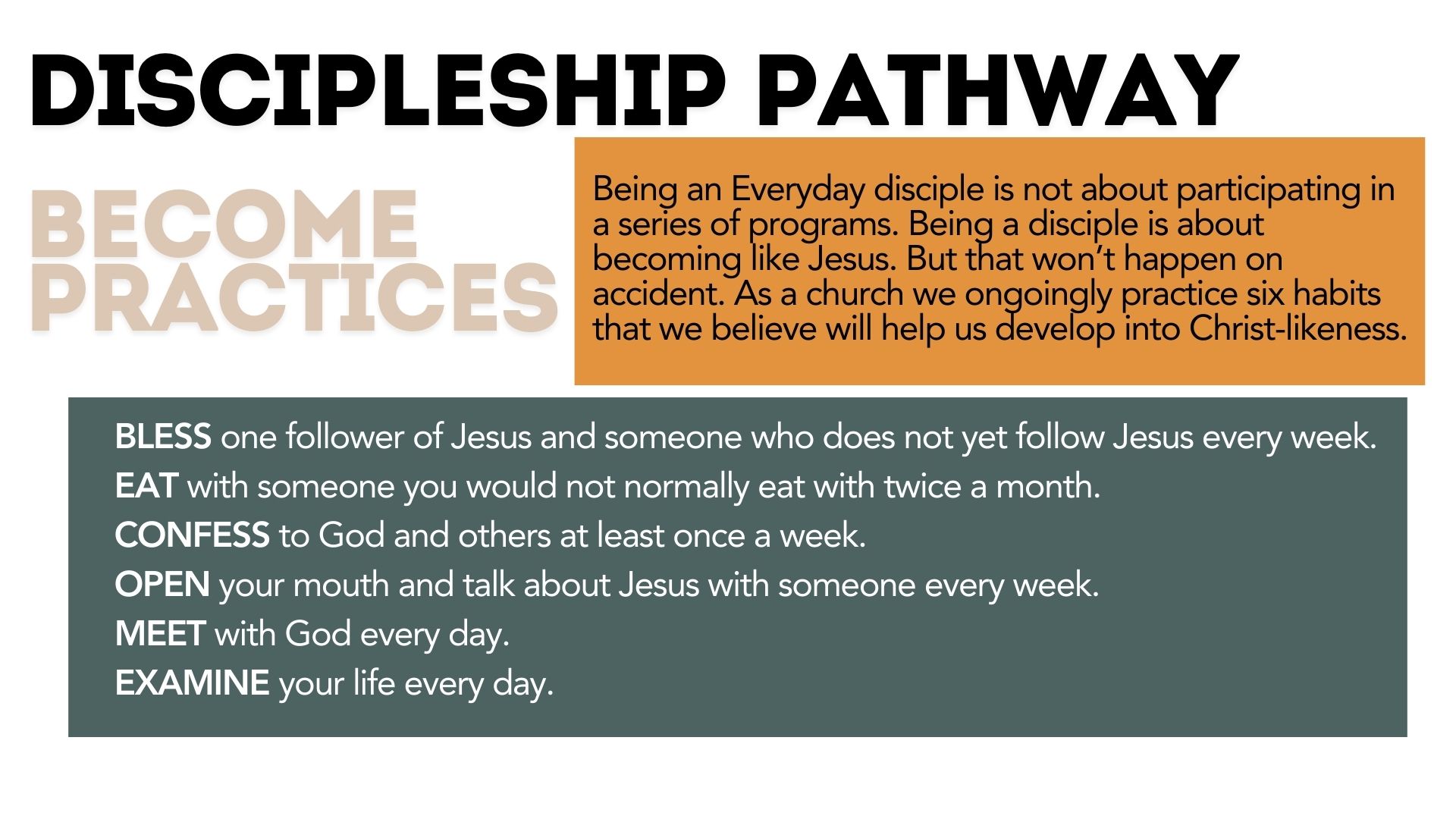Becoming Everyday Disciples
I-90 Community Church is committed to making Everyday Disciples. It’s not just one of the things we want to do, but it’s at the core of who we want to be.
Everyday Discipleship is our why.
What is Discipleship?
But what is a disciple? This is a question that has been answered in different ways throughout history. At I-90 we believe that a disciple is a person who is living a certain kind of life. When Jesus called his disciples to “follow” Him, He wasn’t just asking them to be where he was. He was asking them to live a life according to the same pattern that he was living. That’s because Jesus knew that to live a certain kind of life would form a certain kind of person. So, a disciple is a person who lives in the way of Jesus with the goal of becoming like Jesus.
What about beliefs?
You might be scratching your head thinking: “I thought a Christian was a person who believes certain things about Jesus. Are you saying that doesn’t matter?” No. We affirm that you have to believe in Jesus to live like Jesus. Discipleship begins with faith in Jesus as Savior. Faith in what Jesus did is the basis for a life of discipleship. You can’t be a disciple unless you trust your teacher and believe that you are welcome in his classroom. The Gospel is the good news that we can put our faith in Jesus, that he died to take away our sins, and he rose to bring us new life in him. We enter into that new life by faith. But we enjoy that life by living as disciples.
Become Practices
As a church, we emphasize six shared practices that keep us focused on living the way Jesus lived. We know that there might be other important things that disciples can do, but we believe that by implementing these six practices throughout our community, we will make steady progress toward our shared goal of becoming like Jesus. They are:
Bless one follower and one person who does not yet follow Jesus every week.
Eat with someone you would not normally eat with twice a month.
Confess to God and others at least once a week.
Open your mouth and talk about Jesus with someone every week.
Meet with God every day.
Examine your life every day.
We have built the life of the church around the framework of these BECOME practices. We talk about these practices often and are aiming to be a church where we all practice these things together. That said, we know that disciples need other things as well.
As a church we spend most of our Sunday gathering learning from the scriptures together. We believe that disciples are learners, growing in knowledge of the scriptures, worshipping the Lord together and sharing life. We also also offer traditional classes (in formal and group settings) to help disciples develop their understanding of their faith. While our practices are our primary emphasis, we do know that disciples need more.

Discipleship and Formation
If you’ve spent time around different kinds of churches, you will notice different emphases when it comes to discipleship. Over the years, two “camps” have emerged. One emphasizes the moral aspect of discipleship. In this camp, discipleship comes down to “do’s” and “don’ts.” Don’t sin. Do serve, do give, etc. Another group, however, has focused more on spiritual formation. For these churches, the primary focus in disciple-making is looking inward, confronting character flaws, and pursuing love. Too often these camps lack respect for one another. We want to change that.
At I-90, we are trying to adopt the best approaches to making disciples. And that means considering what each person needs. We need real-life focused discipleship as well as spiritual formation, especially at different times in our discipleship journey.
In Matthew 16, Jesus tells his disciples that, “If anyone wishes to come after Me, he must deny himself, and take up his cross and follow Me. For whoever wishes to save his life will lose it; but whoever loses his life for My sake will find it” (Mt 16:24–25). Early-stage disciples need to learn how to make changes in their lives, they need to deny themselves and to obey Jesus’ moral directions, and to be equipped to be a productive part of the Body of Christ.
But late-stage disciples need to focus on verse 25. They need to look inward and confront the walls that are keeping them from becoming truly loving people.
Discipleship Rhythms
Given that disciples need different things at different stages of their discipleship, we have created an annual discipleship rhythm. This rhythm helps create times when the whole church can grow and learn in some areas while also carving out times for growth in particular areas.
In the Fall and Spring we learn in small groups about discipleship necessities. And in the Winter and Summer we encourage and equip you in areas of need in much smaller groups of 2-5 people.
By dividing up the year this way we hope to give you opportunities to grow as a fully formed disciple of Jesus.


